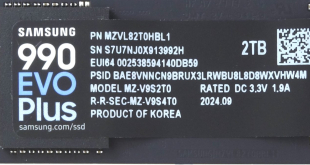RTX 40 Super graphics cards are reportedly just around the corner but rumblings about Nvidia's true next-gen gaming graphics cards are starting to surface. The RTX 50 series is said to be based on the Blackwell architecture, and these GPUs are rumoured to make the jump to GDDR7 memory too.
Kopite7kimi, a regular reporter on GPU rumours and leaks, has contradicted earlier reports that pointed to a 512-bit memory bus for the GB202 GPU, which is expected to power Nvidia's next-gen flagship gaming graphics card. It is now claimed that the GPU will utilise a 384-bit memory bus, alongside new GDDR7 memory.
???And GDDR7.
— kopite7kimi (@kopite7kimi) November 15, 2023
The transition to a GDDR7 memory configuration is expected to increase bandwidth significantly. According to Micron's latest roadmap, the company that has partnered with Nvidia on GDDR5X and GDDR6X memory, consumer GDDR7 memory is projected to reach 32Gbps by the end of the year. In contrast to the RTX 4090, which uses 21Gbps of GDDR6X memory, a possible GB202 GPU with 32Gbps could achieve 1.5 TB/s, a 50% boost. However, it's predicted that GDDR7 memory will run at lower speeds at launch.
According to previously disclosed information, the Nvidia GB202 GPU will include 192 Streaming Multiprocessors (SM), potentially resulting in a maximum configuration of 24,576 CUDA cores, assuming no significant changes are made to the GPU architecture. It's important to note that this is the GPU configuration, not the flagship model's specifications.
While the release date of the Nvidia Blackwell RTX 50 series is unknown, given that the B100 and GB200 graphics accelerators are set to ship between 2024 and 2025, it's reasonable to assume that the gaming series will follow suit.
Discuss on our Facebook page, HERE.
KitGuru says: We're still quite a ways off from seeing fresh new gaming GPUs from Nvidia but rumours are starting to swirl. We should hear more in 2024, as Nvidia typically updates its gaming architecture every two years.
 KitGuru KitGuru.net – Tech News | Hardware News | Hardware Reviews | IOS | Mobile | Gaming | Graphics Cards
KitGuru KitGuru.net – Tech News | Hardware News | Hardware Reviews | IOS | Mobile | Gaming | Graphics Cards


